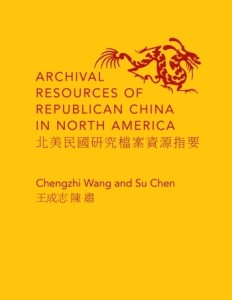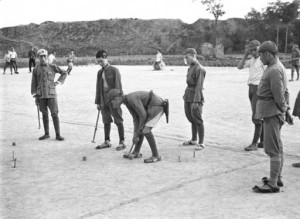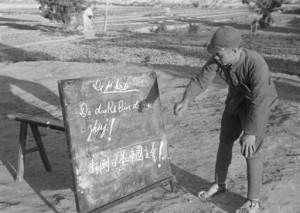Columbia University Press sent me a copy of Wang, Chengzhi, and Su Chen. Archival Resources of Republican China in North America. Columbia University Press, 2015.1 
As a reference book it is incredibly handy. As you might guess, it is most useful for the types of topics where you might find archival sources in the U.S., which means diplomats (considered broadly), journalists and missionaries. They also pay a good deal of attention to photo and film archives. Some of this is merely useful, saving you the trouble of going to the Hoover Institution website to remind yourself about some of the major things they have, or checking out all the Columbia Oral History stuff. More significantly, the authors have done a pretty good job of digging up obscure archives you may not have been aware of. Did you know that Harrison Forman’s papers are at the University of Oregon? Forman was “a U.S. explorer, aviator, photographer, journalist and author” who interviewed Mao Zedong and Zhou Enlai, and, given his time in Tibet, was the technical director for the Oscar-winning film Lost Horizon. You may remember him as the author of Report from Red China and How to Make Money With Your Camera. Wang and Su describe the collection, tell you that there is an on-line finding aid here. Parts of it have been digitized by the University of Wisconsin-Milwaukee Libraries. Diaries are here Photos here.
So if you need pictures of pre-1937 Red Army soldiers playing croquet, posing with their bicycles, or learning to denounce Japanese imperialism (in both characters and cursive pinyin. Why cursive?) you can find them.
The whole book is like this, providing you with both descriptions of the collections and links to on-line finding aids and also to related collections. It really is an invaluable tool if you are trying to track down sources in North America. Many collections are in the process of digitization, and this volume is really helpful for finding out how far the process has advanced and where to find things.
There is an introduction by Joseph Esherick,2 and he points out, correctly, that having all the entries in both English and Chinese may encourage Chinese scholars to use these collections, which is of course all to the good. Esherick also points out that access to archives in China is becoming more and more problematic. In his own work on Chinese archives, Esherick discussed the openness of various Chinese archives.3 Today you can track openness, to some extent, through Dissertation Reviews.
On the one hand, I wondered why this book was published in dead tree form at all. More things are going to be digitized, there are plenty more archival sources that could be included. The authors mention possible future editions, but why not just do it on-line so you can update constantly, like Dissertation Reviews? That would be particularly helpful for questions like “Did anyone actually get to look at anything at the Number Two last summer?” On the other hand, given that these are North American collections and under the North American archival culture, I’m not sure how much that matters. All these collections are open, and will almost certainly remain so. The only question is how much digitization has been done, and what is the URL. Twenty years ago it was possible to hope that China was on a path towards open archives (also, democracy) but it is harder to hope for that now. Chinese archives are being digitized, but this is not to increase access. I have blogged about the digitization process before.
But today I am less hopeful that digitization will lead to more open archives.4 China’s archive culture is quite different than that in North America. Esherick mentions the many Chinese scholars (academic and not) looking at Chiang Kai-shek’s diaries at Stanford. This book is, among other things, and invitation to Chinese scholars to use other North American archives. I hope they do. The Chinese archive culture does not seem to be moving in the direction of greater openness, however. I remember visiting one Chinese archive, ready for the normal process of negotiating access, and having my heart sink as a saw a giant calligraphy scroll declaring
保护档案 (Protect the archives!)
Protect them from what? People looking at them, of course. Will we end up with with a situation like we had before 1976, where the best place to do research on Chinese history was outside China? I hope not, but if we do, this book will be even more valuable than it is now.
Do you know if you are part of a group blog publishers will send you cool books to review/comment on? Nice work if you can get it. And you can. Drop me a line. ↩
There is also an introduction by Eugene Wu. ↩
Ye, Wa, and Esherick eds. Chinese Archives: An Introductory Guide. Institute of East Asian Studies, University of California, 1996. ↩
For what it is worth, after I was invited to look at the digitization process in Shaanxi, I ended up banned from the archives for a few days while, I assume, a power struggle took place about openness. I got better. ↩



1 Comment